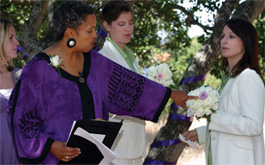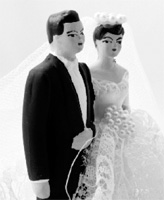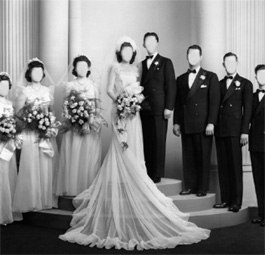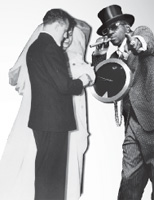home | metro santa cruz index | features | santa cruz | feature story

Acceptance and blessing: Nondenominational ministers tend to be more open-minded and will provide many services that a traditional church minister would scoff at, such as this same-sex marriage ceremony performed by Rev. Deborah Johnson.
My Big Fat Nondenominational Wedding
Alternative wedding officiants bring flexibility and fresh ideas to the wedding business
By Steve Hahn
Weddings are rich in symbolic meanings that can reflect a couple's past along with their vision for a shared future. But for most of us, society's image of the ideal marriage has already been imprinted in our minds from an early age through storybook and Hollywood depictions as well as the marriage ceremonies of relatives. Indeed, engaged couples can become so caught up in the whirlwind of pressures to achieve this ideal that, in the process, they end up overlooking the deeper meanings their wedding day ceremonies are intended to represent.
Zoe Elizabeth, a Santa Cruz resident who has helped officiate four weddings and is gearing up for her own wedding this summer, encourages couples to see the traditional Christian wedding as one possibility among many. This should be no problem in Santa Cruz County, where the alternative wedding market is bursting at the seams with options.
"A lot of people don't realize that they can do anything different and they don't think about the things that they actually are doing," says Elizabeth. "All the traditions in a wedding have a symbolism that we just don't think about. It's important to think about if these things have meaning for you."
The contrasting meanings of different marriage ceremonies are exemplified in the two Wiccan weddings Elizabeth helped officiate.
In a traditional Christian wedding the bride is led down the aisle by her father, who offers her to the waiting groom, which can be seen as signaling not only his approval but also a transfer of ownership. In a Wiccan wedding, however, bride and groom both join their family and friends in a circular arrangement that places neither party in a subservient relationship to the other.
So should you buck the traditional wedding and its vile patriarchal oppression? Maybe, but maybe not. The father walking the bride to the groom can also represent the blending of two families into a new community.
What's more important than the format of the wedding ceremony finally chosen, many local wedding officiants suggest, is that a couple considering marriage go through the process of exploring their options and reflecting on how the ceremony they choose will best symbolize their shared future vision.
When it comes time for Rev. Deborah Johnson, founding minister of Soquel's Inner Light Ministries, to marry members of her flock, she finds herself constantly rearranging or creating new parts of the ceremony to ensure it fits the personalities and cultural backgrounds of the bride and groom.
"At Inner light ministries we're very multicultural and multiethnic," she says proudly. "We have people from very many religious backgrounds. Even the people making the commitment to each other may come from different backgrounds. So I try to find a middle ground that is going to be appealing to their families and to the individuals. That can be reflected in the décor, the music, the readings, the rituals."
The fluidity of her approach, perhaps simply an outgrowth of Inner Light Ministry's promise to "support all paths that lead to the truth of oneness," gets the attention of the audience, who often think they're going to see yet another standard, cookie-cutter wedding.
"It's always fresh, it's always new," says Johnson. "People don't know exactly what's going to happen. They don't yawn. They don't fall asleep. They are engaged."
The discrimination that marginalizes interfaith weddings in numerous traditional religious settings drives many couples from diverse religious backgrounds to seek the open-minded acceptance of nondenominational wedding officiants.
Etiel Herring, a Jewish spiritual leader certified by Berkeley's Chochmat HaLev (Wisdom of the Heart), began officiating weddings when she was working as a psychotherapist in Los Angeles. Since moving to Santa Cruz, she has helped many members of the local Jewish community marry non-Jewish spouses, something that most rabbis refuse to do.
"I approach interfaith marriages as a Jew, but I want to welcome everyone," she says. "So I leave the door open. Some people have decided down the road to convert and some haven't."

Glazed and confused: Engaged couples can get so caught up in achieving the storybook wedding ideal that they miss out on the ceremony's deeper meanings.
While Johnson and Etiel both celebrate interfaith love, they also maintain a strong focus on religious themes in their ceremonies.
For those looking to keep belief structures out of their marriage day entirely, there are a surprising number of options. Gail Swain, licensed with the Universal Life Church, will arrange her ceremony to the specific tastes of the wedding couple.
"If they want me to talk about God, I can talk about God," says Swain. "If they want me to talk about Buddha, I can talk about Buddha. Or if they want me to leave those things out, I can do that for them. That means that the weddings that people get are comfortable for them; they're more tailor-made to their own belief systems and their own lives."
Ok, so there are options for various religious groups and even for atheists or agnostics, but what about the truly wild, no-holds-barred weddings that would send your average minister running for the nearest mental asylum?
Look no farther than T. Mike Walker, a.k.a. The Traveling Minister. While he no longer performs weddings, he has overseen what must be some of the wildest Santa Cruz weddings in recent history.
In his book, The Butterfly Bride, Walker relates the story of a client who called to request his presence at a nighttime wedding taking place that very night. Since Walker's young son was away at a family member's house and his schedule was clear for the night, he agreed. When he arrived, the wedding party was waiting on the back deck. Walker proceeded through the house to the hot tub in the back only to find the small wedding party soaking stark naked in the hot tub. Did Walker run in disgust? Of course not. He stripped off his clothes, jumped into the tub and happily pronounced the couple husband and wife.
Walker sees all weddings, including situations that would curl the collar on a priest's neck, as intensely spiritual.
"You don't have to evoke God to recognize that what you're doing is a sacred thing," he says. "You're committing your lives to each other. You're saying 'Hey, I'm going to back you up, support you, I'm going to take care of you.'"
The freedom afforded by stepping outside the traditional wedding format also allows for increased involvement of the larger wedding party, something that Rev. Johnson believes expands "the sense of ownership" of a ceremony.
For Elizabeth, that sense of ownership is turning out to be a very important consideration in planning for her August wedding.
"There is a balance between the wedding being your day and being everyone else's day," she says. "Weddings are all about your community. You're asking people to come really far and, although you don't always ask for a gift, they are usually given. People put a lot of effort into your wedding. As a hostess it's respectful to provide something for those people."
She intends to have her friends contribute however they can in order to create a community spirit around the wedding day. She has befriended quite a few musicians in her time and plans to have as many as are willing play at her wedding day. She may also have a pre-wedding "craft party" and has suggested to her chef friends that they prepare something special, although she is careful not to push too hard.
If all goes according to plan, Elizabeth's wedding will be a celebration of more than just her marriage to her long-time boyfriend.
"We're all about creating an environment where people can come together and show off their talents," she says. "It can be our special little world for a weekend."
This incorporation of family and friends into the wedding ceremony gives an active role to what would traditionally be passive well-wishers.
At an Inner Light Ministry ceremony, Johnson will often have members of the wedding party offer a pledge to support the bride and groom in their new marriage.
"They're not just sitting back as witnesses to something someone else is doing," she says. "They're brought into the ceremony as a sacred member of a broader support group."With divorces and second marriages firmly established as fixtures in the American cultural landscape, brides and grooms often bring children from previous marriages into their new wedlock. The status and role of these stepchildren in a new family can be a touchy subject, and the issue may be swept under the carpet in a traditional church setting, where the reality of previous divorces can invoke feelings of shame.
Here again, the flexibility of nontraditional weddings can provide solutions. Walker would often perform inclusion ceremonies in which the children were given symbolic gifts paralleling the rings exchanged between bride and groom. According to Walker, this would help ease some of the nervous tension held by the children at the same time it offered the stepparents a way to show love for their newest family members.

The wedding-industrial complex: Your faces here for just $36,830--the average cost of a wedding in the Santa Cruz area according to www.costofwedding.com.
Whether you are planning your first wedding or your fourth, there will undoubtedly be multiple pressures testing you and your new spouse's sanity. Every conceivable topic--from which cousins you'll invite to what color you'll make the streamers--can erupt into a nasty dispute that will ruin an otherwise joyous milestone. Walker saw so many of these disasters that his next wedding-themed book will be titled Weddings From Hell.
Swain sees the stress of weddings as stemming from inexperience in the planning field, and encourages couples to get outside help, whether from a traditional or nondenominational officiant.
"They're planning the biggest party of their lives and some of them have no experience planning parties," she says. "So, they're amateur event-coordinators and they can get drowned in the details."
Another factor contributing to the wedding planning blues, notes Elizabeth, is money.
"With the wedding-industrial complex, this huge business monolith, there is a lot of pressure on people to have certain kinds of weddings," she says. "Particularly on women to be a certain way."
Yet Elizabeth encourages couples to resist the assumption that a meaningful wedding requires a huge pocketbook.
"A wedding doesn't have to be about amassing a huge amount of debt," she says. "Out of the four weddings I have gone to, two of them were $20,000 and above, one was $2,000 and one was $4,000. Each one was glorious in it's own way, so it can be done."
A large portion of a wedding officiant's duties include sorting out the various pressures acting on the couple and getting at the root of why they wanted to get married in the first place.
"One of the first questions I ask them is 'What is your intent?," Johnson says. "I ask them their intent as far as getting married, what they plan to bring to the relationship, what they plan to offer to the other person's life. I try to make them think of it from a number of different angles."
Regardless of whether your wedding will follow tradition or take on one of the newer forms evolving around the county, Metro Santa Cruz encourages you to relax, think about the real reasons you're getting married and ignore that nagging feeling that the invitations had an embarrassing typo.
"Weddings are probably, from any vendor's viewpoint or even from the groom and bride's or their parents' viewpoint, one of the most high-stressed crazy-making moments of anybody's life," says Walker. "I always encouraged couples to relax, enjoy every step of the way and not take it all so intensely serious. You have an ideal, and then there's reality. You have to go with the flow."
Rev. Deborah L. Johnson of Inner Light Ministries--831.465.9090;
www.innerlightministries.com
Gail Swain--831.459.9248; www.gailswainsantacruzweddingofficiant.com
Etiel Herring--831.426.9432
T. Mike Walker doesn't do weddings anymore, but you can still find helpful
information on his website at www.town
scribe.com.

Flavor of love: Matrimony's Public Enemy No. 1 shows us how it's done.
You Are About to Become an Officially Ordained Minister!
Has this gripping article inspired you to buck the system and take marriage into your own hands? It may be easier than you think!
The Universal Life Church, in its undying quest for religious freedom and the spread of "that which is right," has made it ridiculously simple to become an officially ordained minister. And you thought this stuff could only be found in the back of old comic books!
While the Universal Life Church is no doubt looking to bring forth the divine within each of us, the important consideration here is that, under California law, being an ordained minister gives you the power to legally marry people (albeit not against their will).
To begin on your path toward spiritual enlightenment and a much cheaper wedding, go to www.ulchq.com, then click on the ordination tab at the top of the screen. Scroll down and fill out the very short ordination form. Await the email (should be coming in two-four days) and get ready to exploit your new position as minister of an officially recognized church!
Steve Hahn
Send a letter to the editor about this story.
|
|
|
|
|
|